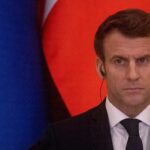
(Adds U.S., China, U.N. comment)
By Michelle Nichols
UNITED NATIONS, March 25 (Reuters) – The United States will push the U.N. Security Council to “update and strengthen” international sanctions on North Korea over its “increasingly dangerous provocations,” the U.S. Ambassador to the United Nations Linda Thomas-Greenfield said on Friday.
She made the announcement during a meeting of the 15-member council to discuss the latest in a string of missile launches by Pyongyang this year. North Korea launched what it called a new intercontinental ballistic missile (ICBM) on Thursday.
Nuclear tests and ballistic missile launches by North Korea have long been banned by the Security Council. Pyongyang has been subjected to U.N. sanctions since 2006, which the Security Council has strengthened over the years.
“Now is not the time to end our sanctions, now is the time to enforce them,” Thomas-Greenfield said. “Offering sanctions relief, without substantive diplomatic progress, would only funnel more revenue to the regime and accelerate the realization of its WMD (weapons of mass destruction) and ballistic weapons goals.”
She did not give any details on the planned U.S. proposal to strengthen U.N. sanctions, which aim to cut off funding for Pyongyang’s banned programs.
North Korean allies China and Russia are likely to oppose such a move. They have instead long been pushing for an easing of U.N. sanctions to improve North Korea’s humanitarian situation and to encourage Pyongyang to return to denuclearization negotiations with the United States and others.
“No party should take any action that would lead to greater tensions,” China’s U.N. Ambassador Zhang Jun told the council on Friday. “The U.S. must not continue to brush aside the DPRK’s justified demands. It should offer an attractive proposal to pave the way for early resumed dialogue.”
North Korea’s formal name is the Democratic People’s Republic of Korea (DPRK). North Korea’s leader Kim Jong Un said Thursday’s ICBM test was designed to demonstrate the might of its nuclear force and deter any U.S. military moves.
U.N. political affairs chief Rosemary DiCarlo told the council on Friday that the last time North Korea conducted an ICBM test was Nov. 29, 2017.
“The DPRK also appears to be actively pursuing its nuclear programme,” she said.
DiCarlo stressed that “the unity of the Security Council in this matter is essential to ease tensions, overcome the diplomatic impasse and avoid a negative action-reaction cycle.” (Reporting by Michelle Nichols; Editing by Leslie Adler, Bernard Orr)




